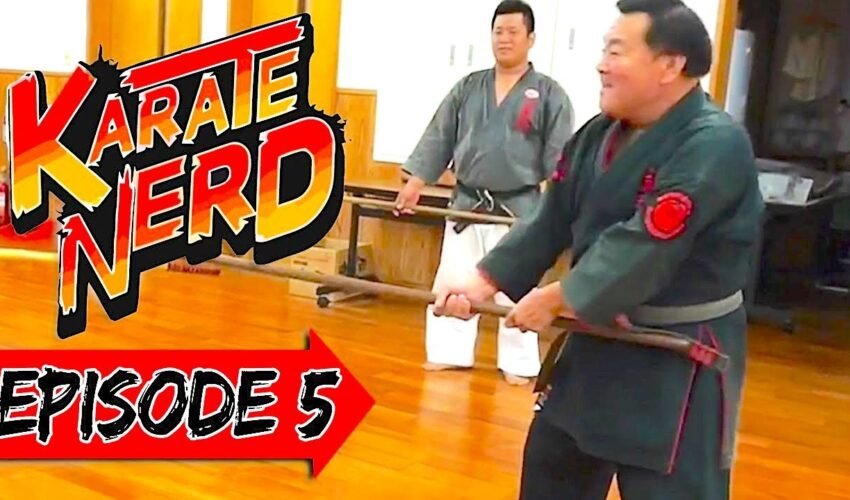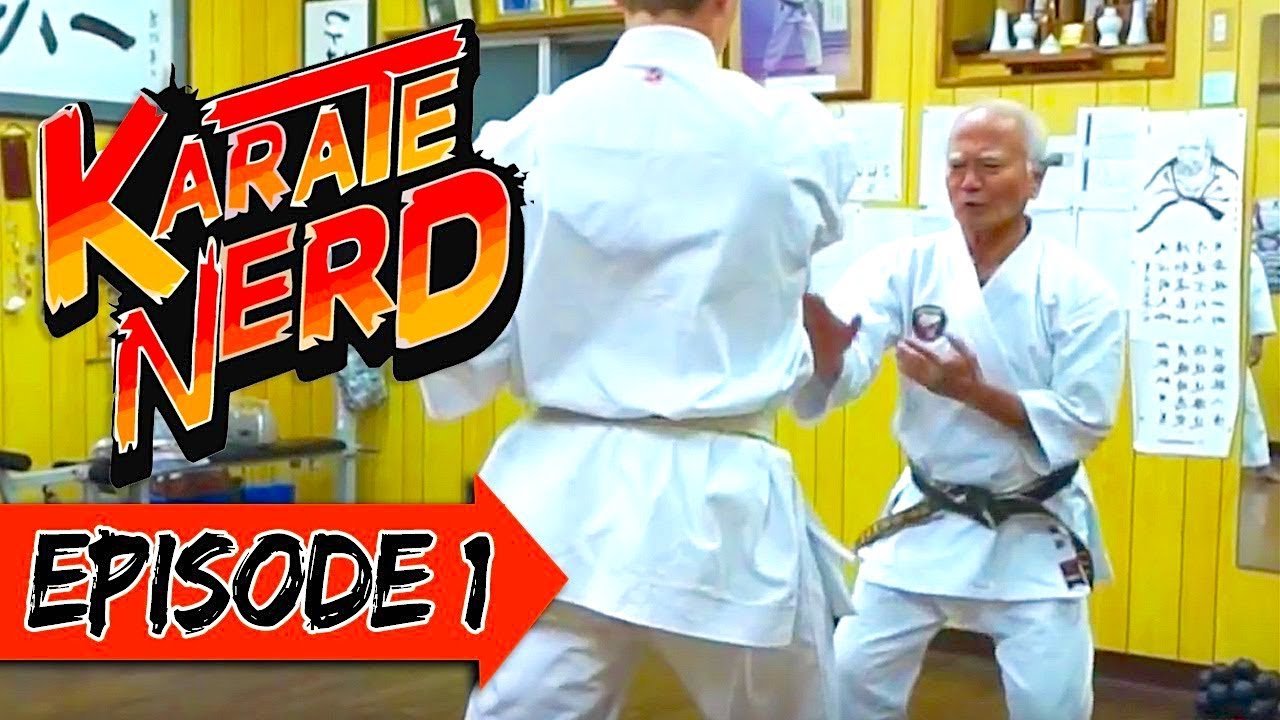Exploring the roots of Karate with Jesse Enkamp
In episode 5 of Jesse Enkamp’s Karate Nerd in Okinawa series, titled “Ryukyu Kobudo w/ Kinjo Masakazu (9th dan),” we delve deep into the roots of karate and its cultural origins. Uploaded on January 18, 2017, the video has since garnered 130,695 views and offers a comprehensive insight into Japanese martial arts.
The video begins with an exploration of Japan’s culture and language, noting the unique color-coding system for stoplights. Moving on, Jesse shows us the famous Chinese style garden, known as fushū-en kōen, symbolizing the friendship between China and Okinawa and their shared martial arts influences.
Jesse then delves into the etiquette of karate practice in Okinawa, highlighting the importance of adhering to a single sensei or dojo style. But as a ‘Karate Nerd’, he breaks convention by training with multiple teachers, crediting his established connections for this privilege.
Viewers are then treated to a visit to the dojo bar run by James Pankiewicz, a meeting place for karatekas from around the world. We also get to see Jesse teaching English to a class of Japanese kids, a unique exchange of knowledge and culture.
The highlight of the video is the training session with Kobudo master Kinjo Masakazu. With a 9th dan black belt, Kinjo is a master of his craft, and viewers get to see him in action and learn about the traditional weapons used in Kobudo. The video ends with a reflection on the state of martial arts in Japan and the struggle many masters face to make a living from their art.
All in all, Jesse Enkamp’s video is a captivating exploration of karate, its cultural roots, and the passion that drives its practitioners. Every episode of the series offers a new and informative perspective on the martial art and its place in Okinawa’s culture.
[postx_template id=”84″]
About Jesse Enkamp
Jesse Enkamp, famously known as the “Karate Nerd”, is a dedicated karate practitioner and instructor with a global recognition. He strongly believes in the power of traditional karate, and works relentlessly to encourage others to tap into its many benefits. He uses his well-produced YouTube videos, informative blog posts, and innovative teaching methods to spread his passion and knowledge of karate among practitioners worldwide. Jesse’s authentic respect for the art form coupled with a deep understanding of its history and culture is inspiring, making him a highly influential figure in the world of martial arts.
Discovering the Art of Karate
Karate is a traditional Japanese martial art, which has been embraced globally due to its physical and mental benefits. It’s not just about self-defense; karate promotes self-discipline, respect, and mental strength while improving your physical health. Whether you opt to practice it casually or focus on advancing through the ranks, this martial art offers a fantastic way to boost your fitness levels and enhance your concentration. Learning karate can be an enriching journey, filled with personal growth opportunities and rewards that go far beyond its sporting aspect. Discover the power of karate today.
[postx_template id=”85″]
The History of Japanese Martial Arts: Focus on Okinawa
The roots of Japanese martial arts run deep, but none more so than in the island of Okinawa. Okinawa’s unique history as a trading post led to a diverse influence of combat styles, including Chinese kempo, that transformed into what we recognize as karate today. Historically, Okinawans secretly practiced these martial arts forms, a direct response to oppressive Japanese rule that banned weapons. This led to the development of “te”, a hand-to-hand combat technique, and the art of “kobudo”, a weapons system utilizing farm tools. These unique Okinawan adaptations underline the convergence of culture, survival, and martial discipline.





 (Omote, Ura, Honto)
(Omote, Ura, Honto) 





All 8 episodes can be found on my website: http://bit.ly/2iW7yCm
One reason the world's best instructors have to supplement their incomes is because they have too much integrity to open a McDojo. Once when I was practically starving in Baltimore in the 1980s, a real fraudster offered me a branch manager position at his chain of extreme McDojos. This guy played disco music during sparring, and he caused all U.S. karate schools to be investigated by the FBI. I turned it down. So I started teaching my students part time and working full time as a night watchman, and to save cash I moved into my school. All these years I have felt as though I failed. Thank you Jesse for letting me know that even the world's best instructors, far greater than me, have also had to take outside jobs. Suddenly I feel better about myself. Thank you so much!
one person can have one master
– my master
Wow .. that last part was deep.. and kinda hit me emotional. I walked into a dojo today because I wanted to learn Okinawan karate (the roots or the grandfather of karate is what I call it) to help with my MMA . My friends think I’m crazy and believe it’s a waste of time. But something inside me tells me I need to learn it. And I had a chance to talk o the headmaster. He is a humble Okinawan and was happy to see a student walk in. After two days I said sign me up. It’s nothing I’ve ever done before and very philosophical. It’s challenging. I thank master Kiyoshi Arakaki. As of today on my 4th day of class. I am now a student of Muso-Kai karate in SLC Utah ♥️ and I hope to achieve beyond blackbelt someday.
Thank you so much
@3:48 “the hibiscus is the national flower for Okinawa. They will sometimes make it into a tea”
is the national flower for Okinawa. They will sometimes make it into a tea”
Mexico : hold my Jamaica .
: hold my Jamaica . 
 . ♥️
. ♥️
id still do it if i were them too.Great journey
13:26 mortal cute
15:16 Is the guy in grey won the first place in Season 2 competition?
Okinawa karate is hardcore wow!
Who's coming to the Dojo bar?
Enjoying the series Jesse. I can understand you becoming emotional at the end.
See ya using staff in Jodo and Nunchucka long time since I have practice these seems half a lifetime away
Maybe their descendants from kryptonians LOL
Dried fruit style hibiscus is awesome too! Idk if you have tried it but if you haven't you should!! It's like a fruit roll up but it's a edible flower it's amazing !
Karate bar, should have a ring, so that when the karate guys get drunk they can spar each other. Like in Thailand.
It's so sad the Dojo Bar closed from Corona. Wishing the whole staff the best
What it is and I've trained a lot Karate. Is the swing like in Boxing and upercuts crosses have more weight and power. That's why a Karate person can't win a boxing competition. Head movement .
and upercuts crosses have more weight and power. That's why a Karate person can't win a boxing competition. Head movement .
Hello Do you have nunchaku Kata on your YouTube channel ?
These videos are a treasure,They really show the dedication to the art of Karate and the culture and lifestyle in Okinawa. Respect
no it we will make them go buy are way
Imagine in the dojo bar lots of karataka drunk asf and starting a fight
11:10 if thanos knew….the infinity gauntlet
There’s an abundance of Karate world wide. Too much of something leads to its reduction in value. It’s sad to see so many masters not make a living from their art. Perhaps to save Karate in Okinawa the government must reduce the number of Karate schools.
19:27 This can be common in the West, too. I've always had some guilt and shame knowing that my teachers had financial distress.
"The five colors will blind one's eye. The five tones will deafen one's ear. The five flavors will jade one's taste. Racing and hunting will drange one's mind." – Laozi
Jesse San.

It would make sense that that the hibiscus plant is the national plant of the Japanese state.
Its also quite popular and a staple in Mexico.
Not surprised we took it from the Japanese, its so dam good.
We just add alot of sugar to it…….
At the early turn of the 20th century many Japanese immigrated to Latin America.
For example Mitsuyo Maeda the man who taught "BBJ" to the Gracies in Brazil would be a prime example.
Its so cool to see how the small little things are connected to history.
Tell when, oh when are you goinng to visit or do a episode on the ultimate truth the art that was created by Sosai Mas Oyama??
Can you please, tell me when???
It just doesnt seem fair thats the only type of Karate or maybe one of few you havent showcased on your channel.
We don't live in a world where teaching Martial Arts is a real full time job. I wish it was but that's just reality.
The beauty of china and japan combine is the most picturesque scene ill ever dream of
Cool Robert
Me pareció ver una bandera argentina en el dojo bar
en el dojo bar
I am rewatching this series again, hope you'll have a 3rd season for Okinawa, Jesse san.
HAHA…I didn't know that Zima still exists
No puedo poner subtitulo en Español,Alquilen más le pasa?
0:29 what are those go-carts doing on the road?
15:57
I'm really enjoying this as showing the culture and places too it would have been so easy for you to just show off your skills and miss those bits out, thank you
Yes, masters hardly make a living, while McDojos feel fine.
Plot twist, Japanese people are colourblind ^^
The ending is very sad indeed. Though I will say here in America while many instructors can and do make a good living, they are sometimes too financially driven.
Man I don't normally comment, but Jesse my friend, you come across as very genuine on screen. I can feel your words mate. Very well done.
The poor masters not living from the art is basically dharma, you earn your living with hurting people and teach others to destroy. A lot of great masters ended like dogs, your body slowly decreases, all your previous wounds begin to torture you in old age and if you are not cautious you lose everything you built up through dharma events like thiefs, tax, crazy family and other unfortunate events. That is one reason why buddha for example refused to become a king and choose to be a monk, he still had some of his memory of past events knowing the living in hell through bad deeds.
Don't mind my comment! I like White Crane, Dragon style, and Snake style, DON'T JUST MIND THIS.